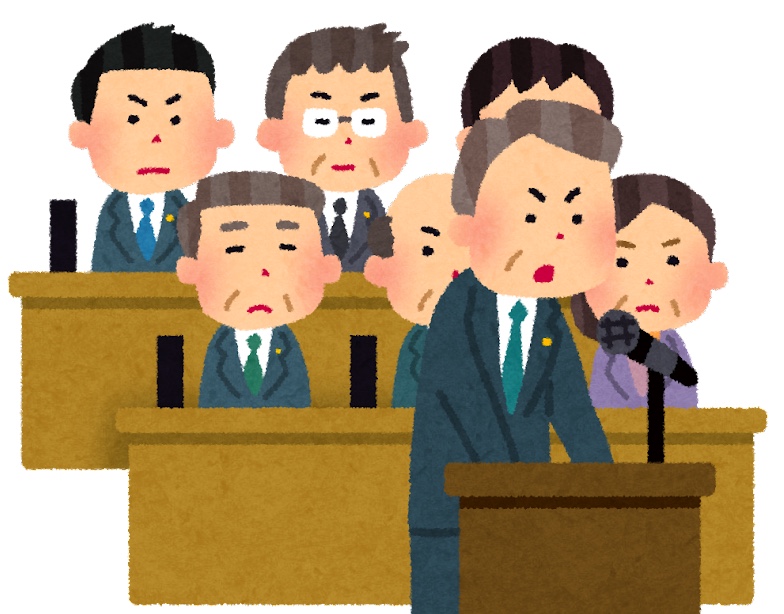What is a Member of Parliament?
First, who are the members of the Diet?
The National Diet consists of the House of Representatives and the House of Councillors.
Therefore, the members of the House of Representatives and the House of Councillors, who make up each house, are called Diet members.
Members of the Diet are elected by the people in elections.
Japan is a society with three separate branches of government (legislative, judicial, and executive).
Members of the Diet are in charge of legislation.
Those in charge of legislation have the role and right to enact laws.
Your standard of living is set by law.
Therefore, legislators, who are in charge of legislation, are an important profession that determines whether your life will be easier or harder.
How much do Diet members earn?
The salary of a Japanese Diet member is called “Seiketsu” (annual salary), and by adding to this amount the “term-end allowance,” which is paid twice a year, one can calculate the annual income of a Diet member.
The amount of annual expenses and year-end allowances are stipulated in the “Law Concerning National Diet Members’ Expenses, Travel Expenses, and Allowances, etc.” The monthly salary is 1,294,000 yen, and the year-end allowance is approximately 6,350,000 yen in total. In total, the annual income of Diet members is approximately 21,878,000 yen.
However, even Diet members have higher annual incomes than Diet members if they hold special positions such as Prime Minister, Minister of State, Vice Minister, or Parliamentary Secretary.
The annual income of the Prime Minister is approximately 40.49 million yen, the Ministers of State approximately 29.53 million yen, Vice-Ministers 28.33 million yen, and Parliamentary Secretaries 24.16 million yen. If a person holding such a special position is a Diet member, only the difference between the Diet member’s salary and the salary of the Diet member is paid to the member holding the special position.
Diet Members’ “Second Salary” or “Privileges
Japanese Diet members are paid 1,000,000 yen per month in “document communication, transportation, and accommodation expenses” (correspondence expenses) and 650,000 yen per month in “legislative office expenses” for research and study related to legislation, totaling 19,800,000 yen per year.
Since there is no need to submit receipts or disclose the use of these funds, they are sometimes referred to as “second salaries.
In addition to “second salaries,” such as correspondence and legislative office expenses, it should be noted that Diet members are granted various “privileges” and “perks.
In addition to the “privilege of non-arrest,” which means that they cannot be arrested while the Diet is in session, there are also perks related to transportation and other expenses.
The privileges related to transportation include free passes on almost all JR train lines and air ticket vouchers for a certain number of round-trip trips between Tokyo and each Diet member’s constituency. The cost of airline tickets for overseas tours is also covered by public funds, and even if they fly first class, the full cost is paid.
Of course, the provision of correspondence and legislative affairs expenses, free JR passes, and air ticket vouchers are all intended to facilitate the activities of the Diet members.
Why such high salaries?
It is actually the personnel costs that cost the most money. To carry out their political activities, Diet members set up their offices, and when the secretaries, clerks, and part-time workers who work here are included, they have at least five people working for them, and at most more than 20 people. The number of “public secretaries,” who are paid by the government, is limited to three, and the rest of the staff must be paid from the legislators’ own income. Even if we calculate the personnel cost at 3 million yen per person per year, paying five persons would amount to 15 million yen per year. If we add to this the cost of various activities and campaign funds, 22 million yen would not be enough.
On the other hand, Diet members receive monthly expenses of 1 million yen for correspondence and transportation, and daily expenses of 6,000 yen for miscellaneous parliamentary expenses (only for those in positions such as regular vice chairpersons), as well as unlimited travel on special JR tickets and up to four round-trip domestic airline tickets per month for free. The annual cost of correspondence alone is 12 million yen. Even so, however, Diet members are often short of money. This creates the need to hold political fund parties or to receive financial support from political parties or factions.
In addition, in order to guarantee the right to participate in politics for everyone, regardless of wealth or poverty, a reasonable amount of money must be set aside. Furthermore, if sufficient revenues are not guaranteed, bribery and corruption may run rampant. Thus, it is also true that a certain amount of financial security is still necessary for calm and clean political activities.




Comments
Thanks for your blog, nice to read. Do not stop.